3单元语法精讲精练(2)
人教版八年级上册英语Unit 3知识点梳理及语法讲义(教师版)

八年级上册英语Unit 3知识点与语法精讲精练词汇梳理(一)完成单词梳理:名词:1. competition比赛;竞赛 2. mirror 镜子 3. kid 小孩;年轻人4. grade 成绩等级5. hand 手6. saying 谚语;格言7. heart 内心;心脏8. fact 现实;事实9. information 信息;消息10. arm 手臂;上肢动词:1. win 获胜;赢 2. care 在意;关心 3. should 应该;应当4. reach 伸手;到达5. touch 感动;触摸6. break 损坏7. share 分享;共享;共用副词:1. loudly 喧闹地;大声地;响亮地 2. quietly 轻声地;轻柔地;安静地3. clearly 清楚地;清晰地;明白地4. truly 真正;确实形容词:1. outgoing 爱交际的;友好的;外向的 2. hard-working工作努力的;辛勤的3. fantastic 极好的;了不起的4. talented 有才能的;有才干的5. serious 严肃的;稳重的6. necessary 必需的;必要的7. loud 响亮的;大声的8. similar 相像的;类似的9. primary 最初的;最早的兼类词:1. both (adj/pron)两个;两个都2. better (adj/adv)较好的(地);更好的(地)3. which (pron/adj)哪一个;哪一些4. though (adv)不过;可是;然而(conj)虽然;尽管;不过5. laugh (v)笑;发笑(n)笑声(二) 词汇变形小结:1. good/well (adj/adv. 好的) — better (比较级) — best (最高级)2. loud (adj. 大声的) — loudly (adv.喧闹地)3. quiet (adj. 安静的) — quietly (adv. 安静地)4. competition (n. 竞争;比赛) — compete (v. 竞争;比赛)5. clearly (adv. 清楚地;清晰地) — clear (adj. 清楚的;清晰的)6. win (v. 赢;获胜) — won (过去式) — winner (n. 获胜者)7. talented (adj. 有才能的) — talent (n. 才能;天赋)8. truly(adv. 真正;确实) — true (adj. 真正的) — truth (n. 真实;真相)9. care(v. 在意;关心) — careful (adj. 认真的;细心的)10. serious(adj. 严肃的;稳重的) — seriously (adv. 严重地;严肃地)11. say(v. 说) — saying (n. 谚语;格言)12. touch(v. 感动;触摸) — touching (adj. 令人感动的) — touched (adj. 感动的)13. break(v. 破坏) — broke (过去式)【练一练】用所给词的适当形式填空1.Class Six won (win) the basketball game but our class lost the game.2.My friend likes telling jokes. He often makes us laugh (laugh)happily.3.Be quiet (quietly)! I have something important to tell you.4.I think Linda dances better (well) than Kate.5.Students can’t speak loudly (loud) in the library.6.Although he is only two years old, he can speak clearly (clear).7.The teacher told us to find out some information (information)about our country and share it next week.8.I’m truly (true) sorry that things had to end like this.st night we saw a movie and it made us touched (touch).10.I don't think differences (different) are important in a friendship.(三) 短语攻关:care about关心;在意be talented in 在……有天赋both...and...……和……都play the drums 敲鼓the singing competition 歌唱比赛be similar to 与……相像的bring out 使显现the same as 和……相同be different from与……不同as long as 只要in fact 事实上primary school 小学get good grades 取得好成绩have fun doing sth 做某事很开心make sb do sth 让某人做某事want to do sth 想要做某事make friends 交朋友be like 像……一样知识点梳理1.Both Sam and Tom can play the drums, but Sam plays them better than Tom. 萨姆和汤姆都会敲鼓,但是萨姆比汤姆敲得好。
必修一 UNit 3 Sports and Fitness 核心单词+重点句型筑基讲含解析

必修一UNit 3 Sports and Fitness 核心单词+重点句型筑基讲义-2025年新高考英语一轮总复习筑基培优方案(人教版2019)必修1 Unit 3 Sports and FitnessPart 1 单元词汇过关01-单元主题写作词汇积累--运动与健康词汇1. exercise n 运动2. diet n. 饮食,日常饮食3.fat n.脂肪4. deadly adj. 致命的5. recover v.康复6. mineral n.矿物质7. calorie n. 卡路里,热量8. vegetable n.蔬菜9. overweight adj. 超重的10. junk food 垃圾食品11. examine v.检查12. snacks n. 零食13. unhealthy adj 不健康的14. lifestyle n. 生活方式15. harmful adj 有害的16. balanced adj均衡的17. regularly adv 有规律地18. relief n.减轻;宽慰19. near-sighted/short-sighted 近视的20. green/organic food 绿色食物21. burden n/v 负担22. moreover adv. 而且;另外23. damage n/v 伤害;损害24. evidence n.证据;证明25. lack n/v 缺乏;不足26. energetic adj.精力旺盛的27. strengthen v.加强28. balance n/v 平衡29. poisonous adj.有毒的30. muscle n.肌肉31. sick adj. 恶心的32. sub-healthy adj.亚健康的33. contain v. 包含;34. unsafe adj. 不安全的35.fit adj.健康的36. dizzy adj. 头晕的37. abnormal adj.不正常的39. chemical n.化学物质40. addicted adj. 有瘾的41. physically adj. 身体上的47. refresh vt 使…恢复; 消除…疲劳48. mental adj. 精神上的49. uncomfortable adj. 不舒服的50. develop/form v.形成;养成51.jogging n.慢跑52.hiking n.徒步53.running n.跑步词块1. feel stressed/depressed 感到压力/沮丧2. suffer from遭受,患上…3. have a pain in ... 某处疼痛 3.relieve pressure 缓解压力4. put sb in a good mood 让某人有个好心情5. have a good rest 好好休息6. relax oneself/feel relaxed 自我放松7. lead to 导致8. take three meals on time 按时吃三餐 9. Take exercise regularly有规律的锻炼10. in terms of…从…方面讲 11. last but not least 最后但并非不重要12. be rich/low/high in .富含/含量高/低... 13. become aware of…意识到14. be optimistic/ pessimistic about…对…乐观/悲观 15. do great harm to对…有害16. keep physically and mentally healthy保持身心健康17. at the risk of …冒险…18.as far as sb be concerned 就…而言19. as for…至于;关于20.face difficulties with courage勇敢面对困难/挫折21.what’s more而且22.take exercise regularly 定期做锻炼23.build up/develop one’s body增强体质24.be beneficial to…对...有益 25.put on/gain/lose weight 发福/减肥26.have a healthy/balanced diet 健康/均衡饮食 27.develop/form a habit of...养成...习惯28. get into a bad habit of…染上...坏习惯02-单元重点词汇背记1.vi.聊天;闲聊2.adj.卡住;陷(入);困(于)3.vt.&vi.浏览;冲浪4.n.慈善;慈善机构(或组织)5.adj.艰难的;严厉的6.n.功能;作用;机能vi.起作用;正常工作;运转7.vt.确认;使确信8.vt.按,压;敦促9.n.折扣vt.打折10.n.账户;描述11.adj.粗鲁的;无礼12.t n.目标;对象;靶子vt.把……作为攻击目标13.adj.假的;错误的14.adj.心烦的;苦恼的;沮丧的vt.使烦恼;使生气;搅乱15.n.作者;作家16.n.忠告;诀窍;实用的提示17.adj.熟悉;熟知18.n.盒;箱;情况;案件03-单元核心词形拓展1. honour n. 荣誉; 尊敬; 荣幸vt. 给予表扬→ adj. 光荣的; 可敬的; 高贵的2. glory n. 荣誉; 光荣; 赞美→ adj. 光荣的; 辉煌的; 极好的3. champion n. 冠军; 优胜者→ n. 锦标赛; 冠军赛; 冠军称号4. determine vi. &vt. 决定; 确定→ n. 决心; 决定→adj. 有决心的5. injure vt. 使受伤; 损害→ n. 损伤; 伤害→ adj. 受伤的6. grace n. 优雅; 恩惠; 魅力; 慈悲→ adj. 优美的; 优雅的→adj. 和蔼的; 慈祥的7. fail vi. 失败vt. 不及格; 使失望→v n. 失败; 失败的人(或事物)8. compete vi. 竞争; 对抗→ n. 竞争者; 对手→ adj. 竞争的; 有竞争力的9. stress n. 压力; 紧张; 重音vt. 强调; 重读; 使焦虑不安vi. 焦虑不安→adj. 紧张的; 感到有压力的→ adj. 有压力的10. athlete n. 运动员; 运动健儿→ adj. 运动的; 运动员的; 体格健壮的11.convenient adj.方便的;近便的→ n.便利;方便强壮的;坚强的04-单元阅读词汇识记1.n.体育场;运动场2.n. 跑道;足迹;铁路轨道vt.&vi. 追踪;跟踪3.n. 健身房;体育馆4.n. 体操(训练)5.n. 传奇故事(或人物);传说6.n. 荣誉;光荣;赞美7.adj. 优美的;优雅的8.vi.&n. 慢跑9.n. 错误;差错05-单元重点词块闪记1.跟随;到达;进步;赶快2.减肥3.由某人决定4.锻炼;计算出;解决5.获得成功;准时到达6.树立榜样7.破裂;破碎;崩溃8.丧失信心;泄气9.放弃;投降10.有道理;合乎情理;表述清楚11.假装做某事12.即使;虽然13.有作用或影响14.而不是15.而不是;代替16.停止做(或使用、食用);剪下17.有时;偶尔18.与……比较Part 2 单元核心词汇精讲精练考点1 .1.honour n.荣誉;尊敬;荣幸【教材原句】As a player,Lang Ping brought honour and glory to her country.(P38) 作为一名运动员,郎平为她的国家带来了荣誉和荣耀。
Unit3语法(复习讲义)四年级英语上册(人教PEP版)

Unit 3 My friends语法梳理:描述体貌特征的形容词、形容词性物主代词精讲精练(含答案)❖描述体貌特征的形容词strong(强壮的),tall(高的),thin(瘦的),friendly (友好的),quiet (安静的),【知识链接】描述人物体貌特征及性格特点的词汇tall高的short矮的thin瘦的strong强壮的young年轻的old年老的beautiful漂亮的long hair长头发curly hair卷发big eyes大眼睛funny滑稽可笑的kind和蔼的strict严格的clever聪明的quiet安静的shy害羞的➢形容词性物主代词定义:用来表示所属关系,通常放在名词前面。
【考题精练】一、词图匹配thin fat short tall1. 2. 3. 4.二、单选题()1. —Who is Tim?—He ________ glasses and ________ orange hat.A.is; anB. have; aC. has; an ()2. She ______ glasses and her ______ are brown.A.have; shoeB. has; shoeC. has; shoes ()3. She ________ long hair and blue ________.A.has; glassesB. have; glassesC. has; glass ()4. —Who is that boy _____ a blue jacket?—He is my cousin.A.inB. withC. on()5. —Who is that man?—_____ is my grandpa.A.SheB. HeC. This()6. This is ______ favourite jacket.A.IB. meC. my()7. Is this ________ bedroom?A.IB. herC. she()8. Amy, _______ schoolbag is on the desk, but I can’t find _______.A.your; yoursB. yours; mineC. your; mine ()9. I am short, but my brother is ______.A.tallB. thinC. small ()10. —What do you think of your new friend?—______A.He is very friendly.B. He is from China.C. He is a teacher. ()11. What’s ________ name?A.heB. himC. her()12. —What’s ______ name?—His name is Zhang Peng.A.heB. hisC. her()13. tall and thinA.又高又矮B. 又高又胖 C 又高又瘦三、判断句子和图片是否相符()1. Bob is a tall and thin boy. He has glasses.()2. He has glasses and brown shoes.()3. —Who is she? —She is my mother.()4. —Who is he? —He’s my father.()5. He’s tall and thin.()6. The boy is very quiet.()7. —What’s his name? —His name is Mike.()8. His father is strong.()9. Tom is short and thin.()10. She has short hair.()11. He is tall and thin.()12. It has a hat.()13. It has a hat.()14. He has glasses.四、选词或短语填空short tall long hair short hair brown shoes glasses red bag green bag1. Zhang Peng is . John is .2. Sarah has . Liu Yun has .3. He has a .4. She has . He has a .my your his her our their5.—Is this school bag?—Yes, it is.6.This is my friend, Jack. father is a policeman.7.They are students, school bag are over there.8.I’m tall, I am a girl, hair is long.9.Miss Li is English teacher, we like very much.五、将短语和对应的汉语意思连起来。
高考必考语法精讲精练专题二_代词版含解析

高考必考语法精讲精练语法专题二:代词代词是英语中非常重要的一类词,也是高考必考考点。
《2017年普通高等学校招生全国统一考试大纲》附录语法项目表中对代词考查列了六项:①人称代词②物主代词③反身代词④指示代词⑤不定代词⑥疑问代词。
2015年高考全国卷Ⅰ第54题(完形填空)考查的是代词whoever、whatever、whichever 与whenever的辨析;第63题(语法填空)考查的是its的用法;第78题(短文改错)考查的是不定代词much与many的辨析,第80题(短文改错)考查的是your与our的辨析。
2016年高考全国卷Ⅰ第44题(完形填空)考查的是代词each,another,this与that 的辨析;第68题(语法填空)考查的是its的用法(给出代词it,根据题意须将其变为its);第71题(短文改错)考查的是关系代词that与which的辨析;第79题(短文改错)考查的是our与his的辨析。
2017高考全国卷Ⅰ第70题考查的是关系代词which引导非限制性定语从句。
I.代词种类:II.人称代词、物主代词及反身代词对应关系表:III.不定代词用法注意点:1. one, some与any:1) one可以泛指任何人,也可特指,复数为ones。
some多用于肯定句,any多用于疑问句和否定句。
One should learn to think of others.Have you any bookmarks? No, I don’t have any bookmarks.I have some questions to ask.2) some可用于疑问句中,表示盼望得到肯定的答复,或者表示建议,请求等。
Would you like some bananas?Could you give me some money?3) some 和any修饰可数名词单数时,some表示某个,any表示任何一个。
Unit 3语法(复习讲义)四年级英语上册(译林版三起)

Unit 3 How many?语法精讲精练(含答案)一、“What do you have?”及回答。
解析:1.“What do you have?”是一个特殊疑问句,用来询问对方有什么。
其回答为“I have...”,意为“我有……”,也可以直接回答所拥有的物品。
[例句]—What do you have? 你有什么?—I have some picture books. 我有一些图画书。
2.有时候需要连续询问两三个人,为了避免重复,可以用“What about you?”,意为“你呢?”。
[例句]A: What do you have, Mike? 你有什么,迈克?B: I have a toy car.我有一辆玩具小汽车。
C: I have a toy plane. 我有一架玩具飞机。
【跟踪练习1】一、从方框中选择合适的词并用其适当形式填空。
(每词限用一次)1.—What do you have? —I have some new .2.—Do you have grapes? —Yes, I do.3.—Let’s table tennis. —OK.4.—How many do you have? —I have two pineapples.5.— are new stickers! —Oh! They're nice.二、看图,根据上下文提示完成对话。
第1题图第2题图第3题图1.—What do you have? —I some .2.—I have a pencil. do you ? —A .3.— you have? —I have two .三、按要求完成句子。
1. I have some stickers.(对画线部分提问)do you ?二、“How many…do you have?”及回答。
解析:how many意为“多少”,后接可数名词复数。
“How many…do you have?”用来询问对方拥有某个物品的数量。
英语语法精讲精练与专项练习

1. 中文名与英文名:【中文名】由两部分组成-----姓和名,如:Wang Lili一 ,Sun Wukong. 中文名用汉语拼音写成,姓和名要分开写,开头字母都大写。
英文名与中文名顺序恰好相反,名字在前,姓在后。
如:Jim Alan GreenFirst name Middle name Last name︸ | |Given name(教名) Family name(姓氏)【英文名】一般由三部分组成:首名(first name)、中名(middle name)和尾名(last name),其中first name 和middle name是后起的名字,也叫given name(教名)。
Last name 是家族沿用的名字,也叫family name.【巧学妙记】先姓后名中文名,汉语拼音直写成,姓和名要分开写,开头大写才能行。
英文名,大不同,前面名字后面姓,首名称呼最常用,若要表示受尊重,Mr.Mrs.Miss.Ms.姓前用[专项演练]()1.My full name is Jerry Harry Potter. My first name is_and my family name is_.A .Jerry HarryB .Jerry PotterC .Potter Jerry ()2.I’m Tom Green. You can call (称呼) me_A. Mr. TomB. Mr. GreenC. Green2.物主代词:在英语中,表示“你的,我的,他的,她的,它的,你们的,我们的,他们的”等意义的代词形式就叫物主代词。
物主代词是代词的所有格形式,用来表示物品的归属关系,即某物归某人所有。
【主格代词】在句中主要作主语,一般放在句首,说明是谁的情况。
I am a student.我是一名学生。
She is my sister.她是我的妹妹。
He is in China now.他现在在中国。
03 同位语从句-中考英语总复习 重点语法精讲精练(全国通用)

同位语从句一.什么是同位语?Linda, my English teacher, is very beautiful.I will never forget him, a great leader and thinker.I put my favorite desk, that brown one, in the most outstanding place of this house.以上句子中标红的部分均为同位语。
所谓同位语,是对前面的名词进行解释说明,与前面的名词指的是同一事物或人,一般前后都用逗号隔开。
1.名词作同位语Mr. Wang, my child’s teacher, will be visiting us on Tuesday. 王先生,我孩子的老师,星期二要来看我们。
2. 短语作同位语I, the oldest girl in the family, always had to care for the other children. 我,作为家里最大的女孩,老得照料家中的其他孩子。
3.直接引语作同位语But now the question comes to their minds, “Did she die young because she was a clone?”但是现在他们不得不思考这样的问题:“多莉早死是因为它是一只克隆羊吗?”4.句子作同位语The girls were surprised at the fact that ocean ships can sail up the Great lakes.巨大的海轮可以开到五大湖,让表姐妹俩感到吃惊。
二.什么是同位语从句?上述第四种情况用句子对前面的名词做进一步解释,说明其内容叫做同位语从句。
三.同位语从句的连接词有哪些?引导同位语从句的词语通常有连词 that,whether,连接代词(what, which, who, whose)和连接副词(when, where, why, how)等。
2020年秋人教版八年级上册英语 unit 3单元语法小专题

单元语法小专题(Grammar Focus)语法精讲形容词、副词的比较级1.概念:英语中大多数形容词、副词有三个等级:原级、比较级和最高级。
两者比较用比较级;三者或三者以上相比用最高级。
比较的对象必须是属于同一性质或范畴的人或物。
【注意】比较的对象必须一致;比较的双方必须在同一范围内。
表示两者在某一方面相同时,用“as+形容词或副词原级+as”的句型。
如:I think science is as important as math.我认为科学和数学一样重要。
表示一方在某一方面不及另一方时,用“not as/so+形容词或副词原级+as”的句型。
如:It is not as/so warm today as yesterday.今天不如昨天暖和。
语法精练Ⅰ.用括号内所给单词的适当形式填空。
1.I think Sally did as ________(better) as Lucy in the math competition.2.Linda is much ________ (hard-working) than Anna.3.Who has ________ (many) books,Zhang Li or Li Ying?4.Do you think you are ________ (outgoing) than your father?5.It was cold yesterday,but it is much ________ (cold) today.6.This box is much ________(heavy),isn't it?7.Who is ________ (funny) than you in your class?8.I work ________(hard) this term,but David works even ________(hard).9.Which day was ________(hot),today or yesterday?10.This story is very ________(interesting),but that story is ________(interesting) than this one.Ⅱ.按要求完成下列句子,每空一词。
Unit 3 单元知识速记-七年级上册英语核心知识归纳精练一遍过(人教新目标)

Unit 3 单元知识速记词汇精讲1. thisthis是指示代词,它的意思是“这个”,this一般指时间和距离比较近的人或者事物。
可以指代单数可数名词和不可数名词。
例如:This is a big tree. 这是一棵大树。
This is a piece of glass. 这是一块玻璃。
this 修饰单数可数名词时,名词前面不可以再有形容词性物主代词、冠词、所有格等修饰。
例如:This book is not mine. 这本书不是我的。
This girl is my sister. 这个女孩儿是我姐姐。
this 的复数是these。
例如:This is a pen. 这是一支钢笔。
These are pens. 这些是钢笔。
拓展:this 与thatthis指代离说话人较近的人、物、时间,也可以指说过或者做过的事。
打电话时可以用来介绍自己是谁。
例如:This is a beautiful garden. 这是一个漂亮的花园。
Hello, this is Jim speaking. 你好,我是吉姆。
that是远指,指离说话人较远的人、物、时间,也可以在打电话时用来询问对方是谁。
例如:That’s my classroom.那是我的教室。
Hello, this is Mary speaking. Who’s that? 你好,我是玛丽,你是谁?2. watchwatch作名词时,指戴在手腕上的手表,挂在胸前的怀表或者用来计时的秒表。
例如:I have a beautiful watch. 我有一块漂亮的手表。
拓展:watch还可以用作动词,意为“看,观看”;常用于观看动态的事物。
例如:watch TV 看电视watch a football game 看足球比赛3. callcall v. 打电话。
常见用法如下:(1)call sb. 给某人打电话例如:Please call me tomorrow. 明天请给我打电话。
2024新人教版七年级上册英语Starter Unit 3知识点梳理及语法讲义(教师版)

Starter Unit 3 Welcome ! 知识点与语法精讲精练(一) 完成单词名词: 1. 院子;园圃 __yard __ 2. 胡萝卜 __carrot __ 3. 鹅 __goose __4. 植物 __plant __5. 动物 __animal __6. 花 __flower __7. 湖 __lake __ 8. 农场 __farm __动词: 1. 数数 __count __介词: 1. 在...后面 __behind __形容词: 1. 漂亮的;美丽的 __beautiful __副词: 1. 其他的;别的 __else __ 2. 大声地 __aloud __兼类词:1. (名词) 乐趣;快乐 (形容词) 有趣的;使人快乐的 __fun __2. (形容词/代词) 另一;又一(人或事物) __another __3. (名词) 玩笑;(动词) 开玩笑 __joke __4. (形容词) 许多的;(代词) 许多人;(名词) 许多人 __many __(二) 词语变形1. Fun (n. 乐趣;快乐) -- (形容词) __funny __2. Goose (n. 鹅) -- (复数形式) __geese __3. That (pron. 那;那个) -- (复数形式) __those(那些)__ -- (对应词) __this(这个)__4. This (pron. 这;这个) -- (复数形式) __these(这些)__ -- (对应词) __that(那个)__5. Chicken (n. 鸡) -- (复数形式) __chickens __6. It (pron. 它) -- (复数形式) __they __7. Baby (n. 婴儿) -- (复数形式) __babies __8. Potato (n. 土豆) -- (复数形式) __potatoes __9. Tomato (n. 西红柿) -- (复数形式) __tomatoes __10. Farm (n. 农场) -- (名词) __farmer(农民)__11. Beautiful (adj. 美丽的) -- (名词) __beauty(美丽;美人)__(三) 短语互译1. 看;瞧 __look at __2. 鸡仔 __baby chickens __3. 苹果树 __apple tree __4. 写下__write down__5. 什么动物__what animal__6. 什么植物__what plant__7. 多少__how many__ 8. 注意做某事__pay attention to doing sth.__9. 把...放进...里__put...in...__ 10. 去湖边__go to the lake__11. 跟我来__come with me__ 12. 听音乐__listen to music__13. 讲笑话__tell jokes__ 14. 玩得高兴__have fun__ 15. 在农场上__on a farm__ 16. 把...介绍给... __introduce... to...__ 17. 许多种动物__many kinds of animals__18. 让我数一数__Let me count__ 19. 看那__look there__ 20. 还有什么__what else__ 21. 练习做某事__practise doing sth.__ 22. 在庭院里__in a yard__Section A What is fun in a yard?1.What is fun in a yard? 庭院里有什么好玩的?【用法详解】Fun (不可数名词) “乐趣;快乐”(形容词) “有趣的”常见搭配:have fun = have a good time = enjoy oneself 玩得高兴,过得愉快Have fun doing sth. 做某事很开心Eg: We had fun at the party last night. = We had a good time at the party last night.= We enjoyed ourselves at the party last night. 我们昨天在派对上玩得很开心。
七年级下册英语语法1-5 单元(学生版)
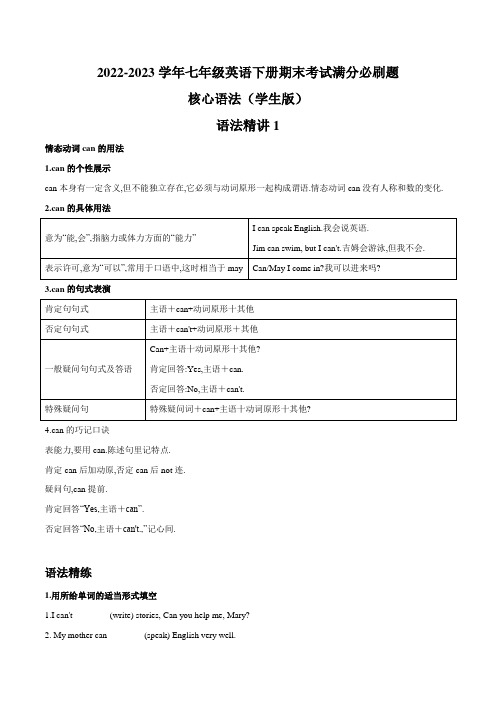
2022-2023学年七年级英语下册期末考试满分必刷题核心语法(学生版)语法精讲1情态动词can的用法1.can的个性展示can本身有一定含义,但不能独立存在,它必须与动词原形一起构成谓语.情态动词can没有人称和数的变化.2.can的具体用法3.can的句式表演4.can的巧记口诀表能力,要用can.陈述句里记特点.肯定can后加动原,否定can后not连.疑问句,can提前.肯定回答“Yes,主语+can”.否定回答“No,主语+can't.,”记心间.语法精练1.用所给单词的适当形式填空1.I can't________ (write) stories, Can you help me, Mary?2. My mother can________ (speak) English very well.3.What can your brother________ (do)?4.Miss Lin can't play the piano, but she can________ (sing)well.5.Little Tom can draw, but he________ (can not) dance.II.单项选择1.(2022·百色中考)- ________ you tell us a story in English?-I think I can do it. Let me try.A. NeedB. CanC. ShouldD. Must2.(2022·北京中考)- ________ I take photos here?-Sorry, you can't. It's not allowed in the museum.A. MustB. NeedC. CanD. Will3.We should learn some basic life skills since we________ depend on our parents some day.A. canB. can'tC. mustD. mustn't4. -What kind of music do you like?-I like music that I________ dance to.A. canB. mustC. shouldD. need5.(2022·成都中考)-There is a new art museum in our city. You________ miss it.-Thank you. I won't.A. can't C. needn'tIII.按要求改写句子(每空一词)1.My father can speak English well.(改为一般疑问句)________ your father________ English well?2.Tom can ride a horse.(改为否定句)Tom________ ________ a horse.3.Mr.Green can do Chinese kung fu.(对画线部分提问)________ ________ Mr. Green________?4.Can Tom and Jim draw pictures?(作肯定回答)Yes, ________ ________.5.play,can,Cindy,well,the,guitar(连词成句)___________________________________________________________________________________________?语法精讲2一、频度副词二、一般现在时三、句式结构语法精练1.用所给单词的适当形式填空1.Mary usually________ (go) shopping with her mother on Sunday.2. ________ (do)Peter________ (take)a shower in the evening or in the morning?3.Lisa________ (not do) her homework in the evening.4.She never________ (eat) hamburgers for lunch.5.-What time Jack________ (go) to bed?-At 10:30 p.m.II.按要求改写句子(每空一词)1.Mr. Green usually goes to work at seven o'clock.(改为一般疑问句) ________ Mr. Green usually________ to work at seven o'clock?2.Anna always plays volleyball after school.(改为否定句)Anna________ plays volleyball after school.3.I do my homework at home on weekends.(改为否定句)I________ ________ my homework at home on weekends.4.Lisa sometimes eats bread for breakfast.(对画线部分提问)________ ________ ________ Lisa________ bread for breakfast? 5.They usually exercise in the morning.(用he改写句子)________ usually________ in the morning.语法精讲3一、how引导的特殊疑问句1.直接由how引导的特殊疑问句2.由“how+形容词/副词”引导的特殊疑问句二、交通方式的表达语法精练I.根据句意填写疑问词(组),完成句子1.- _________ does Linda get to school?-She takes the bus.2.- _________ _________ does it take you to get home from work? -About twenty minutes.3.- _________ _________ is it from here?-One hundred kilometers.4.-I walk to school. _________ about you, Jane?-I ride my bike.5.- _________ _________ people are there in the photo?-Six.II.单项选择1.(2022·安徽滁州凤阳博文国际学校期末) I usually_________ to the bus stop, and then go to school by bus.A. by bikeB. on my bikeC. in my bikeD. ride my bike2.- _________ does Bob usually go to work?-He usually rides his bike.A. WhatB. HowC. WhereD. Who3.(2022·浙江杭州萧山城区期中)-Excuse me. _________ is it to the East Station?-About half an hour by taxi.A. How manyB. How longC. How farD. How old4.- _________ do you visit Uncle Tom?-Once a week.A. How longB. How oftenC. How soon语法精讲4一、祈使句1.祈使句的定义表示请求、命令、建议、警告、劝说等的句子叫祈使句.在祈使句中,肯定句一般以动词原形开头,通常省略主语you;否定句在动词原形前加don't.2.祈使句的句式结构3.祈使句用法口诀祈使句,祈使句,请求、命令或建议.主语是you常省去,动词原形开头记.否定形式要注意,句首要把don't加.要讲客气用please,句首、句末没关系.二、must和have to辨析1.两者均意为“必须”.must更强调说话者的主观意愿,have to强调客观需要,意为“不得不”.2.must一般只表示现在,没有人称和数的变化;而have to则可以用于不同的时态,有人称和数的变化.3.两者的否定式含义大不相同.mustn't 意为“不准;禁止”,而don't have to意为“不必”.【注意】以must开头的一般疑问句,其肯定回答用must;否定回答用needn't或don't have to.语法精练1.用所给单词的适当形式填空1. _________ (finish)your homework first.2. _________ (not come) to the zoo before 6 o'clock, please.3.Please_________ (be) quiet in the room.4.No_________ (swim) in the river!5.They have to_________ (do) their homework when they get home.II.单项选择1.(2022·广西河池凤山期末) _________ play the guitar here, Jack. It's too noisy.A. Can'tB. NoC. Don'tD. Doesn't2.(2022·湖南郴州期末)-Jack, _________ leave the dirty dishes in the kitchen!-Sorry, Mom.A. can'tB. doesn'tC. don't3.(2022·湖南株洲攸县期末) _________ run in the hallway, children!A. Don'tB. NotC. Can't4.(2022·江西宜春期末)-Can I go out with Lisa, Dad?-Yes, but you_________ come back home before five o'clock, You'll have an art lesson then.A. mustB. canC. mustn'tD. can't5.(2022·浙江宁波海曙区期中)We_________ be noisy in the library and we_________ keep the books clean.A. have to; mustB. must; can'tC. have to; can'tD. can't; have to语法精讲5一、形容词形容词修饰名词,用以说明事物或人的性质和特征.它通常在句子中作定语、表语或宾语补足语等.二、特殊疑问句1.定义及答语特殊疑问词引导的疑问句叫特殊疑问句,其结构为“特殊疑问词十一般疑问句?”回答特殊疑问句不能用yes或no.回答时要针对具体情况来作出回答.2.特殊疑问词特殊疑问词分为两类:疑问代词和疑问副词,其用法归纳如下:【注意】由why引导的特殊疑问句,一般要用because引导的从句来回答.because是连词,作“因为”讲,其后要接一个句子来陈述理由.例如:-Why does she do that?-她为什么要那样做?-Because she wants to help the person.-因为她想帮助那个人.语法精练I.单项选择1.(2022·江西赣州兴国期末)-Don't be_________. Jack! Help me clean the room right now!-OK, Mom.A. afraidB. lazyC. shyD. quiet2.(北京海淀区期中) _________ is Jenny from?-She comes from the US.A. WhatB. WhoC. WhenD. Where3.(2022·广西北海期末)- _________ do you like this book?-Because it's exciting.A. WhyB. WhatC. HowD. Who4.(2022·福建莆田期末)My brother is very_________. He can always make new things.A. smartB. busyC. kind5.- _________ was the car invented?-It was invented in 1885.A. WhenB. WhichC. WhoD. WhereII.对画线部分提问(每空一词)1.Linda doesn't like math because it's difficult._________ _________ Linda_________ math?2.I can see some books on the table._________ can you_________ on the table?3.Mr. Green often goes to work at 7:30 in the morning._________ _________ Mr. Green often go to work?4.Lions are from South Africa._________ _________ lions from?5.Most students go to school by bus._________ _________ most students go to school?。
02 宾语从句-中考英语总复习 重点语法精讲精练(全国通用)
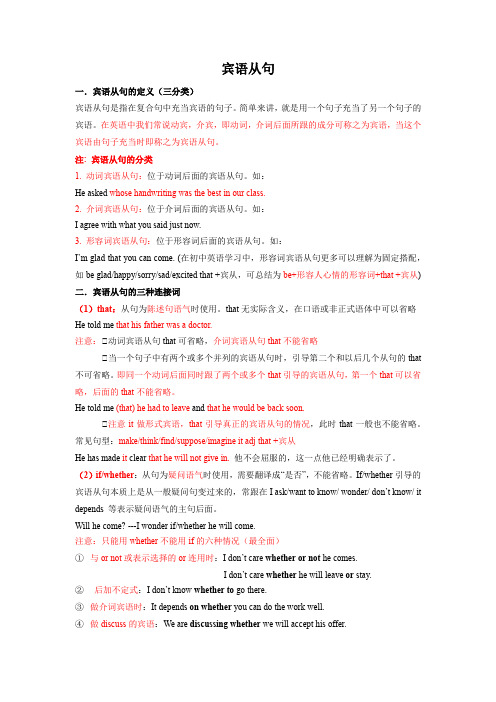
宾语从句一.宾语从句的定义(三分类)宾语从句是指在复合句中充当宾语的句子。
简单来讲,就是用一个句子充当了另一个句子的宾语。
在英语中我们常说动宾,介宾,即动词,介词后面所跟的成分可称之为宾语,当这个宾语由句子充当时即称之为宾语从句。
注: 宾语从句的分类1. 动词宾语从句:位于动词后面的宾语从句。
如:He asked whose handwriting was the best in our class.2. 介词宾语从句:位于介词后面的宾语从句。
如:I agree with what you said just now.3. 形容词宾语从句:位于形容词后面的宾语从句。
如:I’m glad that you can come. (在初中英语学习中,形容词宾语从句更多可以理解为固定搭配,如be glad/happy/sorry/sad/excited that +宾从,可总结为be+形容人心情的形容词+that +宾从)二.宾语从句的三种连接词(1)that:从句为陈述句语气时使用。
that无实际含义,在口语或非正式语体中可以省略He told me that his father was a doctor.注意:①动词宾语从句that可省略,介词宾语从句that不能省略①当一个句子中有两个或多个并列的宾语从句时,引导第二个和以后几个从句的that 不可省略。
即同一个动词后面同时跟了两个或多个that引导的宾语从句,第一个that可以省略,后面的that不能省略。
He told me (that) he had to leave and that he would be back soon.①注意it做形式宾语,that引导真正的宾语从句的情况,此时that一般也不能省略。
常见句型:make/think/find/suppose/imagine it adj that +宾从He has made it clear that he will not give in. 他不会屈服的,这一点他已经明确表示了。
人教版七年级英语上册第三课时 (Grammar Focus3c)—单元同步语法精讲精练 (2)
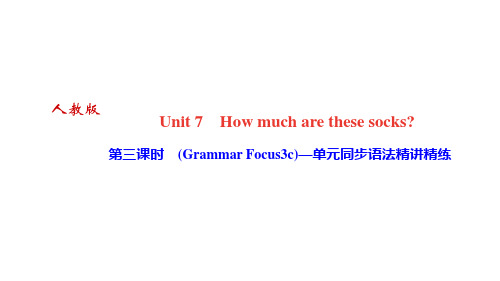
【拓展】How much除了可以询问价格以外,还可以询问不可数名词的 数量,意为“多少”。
人教版
Unit 7 How much are these socks?
第三课时 (Grammar Focus3c)—单元同步语法精讲精练
how much引导的特殊疑问句
how much引导的特殊疑问句,可用来询问商品的价格,意为“多少 钱”。其结构为:“How much+be动词+其他?”如果询问的是单个商 品,be动词用is;如果询问多个商品,be动词用are。
如:I have an interesting book.我有一本有趣的书。 I want to buy a green skirt.我想买一条绿裙子。 ②形容词作表语,一般放在be动词及sound等连系动词后,起到陈述主 语性质、特征的作用。 如:The shoes are white.这双鞋是白色的。 It sounds interesting.那听起来很有趣。
15.A:How much are the green socks? B:__T_h_e_y_'r_e__e_ig_h_t_d_o_l_la_r_s_____.
16.A:I'll take it. B:__H_e_r_e_y_o_u__a_r_e_. ________
17.A:Hello,can I help you? B:Yes,please.__I_n_e_e_d__a_p_a_i_r_o_f_s_h_o_e_s_. ___
人教版英语七年级上册 Unit 3 单元知识精讲及练习

Unit3本单元的主题是the things in the classroom需要掌握的重点是1.如何询问物品的主人 2.物主代词mine/yours/his/hers 3.be动词的一般疑问句及其简单回答语言知识目标:1) 能掌握下列词汇: pencil, book, eraser, box, pencil box, schoolbag, dictionary, his, hers, mine, yours, teacher, excuse me, You're welcome.2) 能掌握以下句型:①—Excuse me. Is this/that…? —Yes, it is. / No, it isn’t.②—Excuse me. Are these/those…? —Yes, they are. / No, they aren't.③What about …?3) 能初运用名词性物主代词mine, yours, his, hers;理解名词性物主代词和形容词性物主代词在用法上的区别。
一、词形变化1.box --dictionary --library -- watch –2.These are happy ________(family).3.My father has two nice ______(watch).4.My uncle and aunt are _________(teach).5.Here are some nice pencil _____(box).6.Here are some ______ (photo) of her family.7.--Are ____(that) your jacket?--Yes, they are.一、词汇(一)英汉互译your dictionary_______________his backpack________________my ruler ____________一块橡皮___________________我的铅笔盒__________________他的卷笔刀_________________她的书_______________在校图书馆________________以什么号码给某人打电话________________in the school library_________________________ ask … for….______________________________Call me at….._________________ E-mail me @..._______________ 一张身份证___________失物招领处________________ 一套钥匙________________劳驾;请原谅________________ 向某人要某物________________ 谢谢你的帮助________________ 学生证_________________电子游戏一串钥匙______________(二)根据句意及汉意写出下列单词(1)“Is this your ID card ?”“Yes, _________.”(2)“Is that her ring”“No , It _________.”(3)How _______you spell watch?(4)What's your phone number ? ________890-5827.(5 ) I lost a set of ___________ (钥匙)二、句型(一)试翻译下列句子1.这是一本书.___________________________________2.那是你的尺子吗?_______________________________是的,它是.______ , ___________________3.这是她的字典吗? ______________________________不,它不是.这是我的字典.________ , _______. It's ________________.4.请打电话给Mike 号码是280-6312_____________________________________(二)完成下列各题1. 我丢了一串钥匙。
人教新目标英语九年级全册 Unit 3 单元语法精讲与精练 含答案
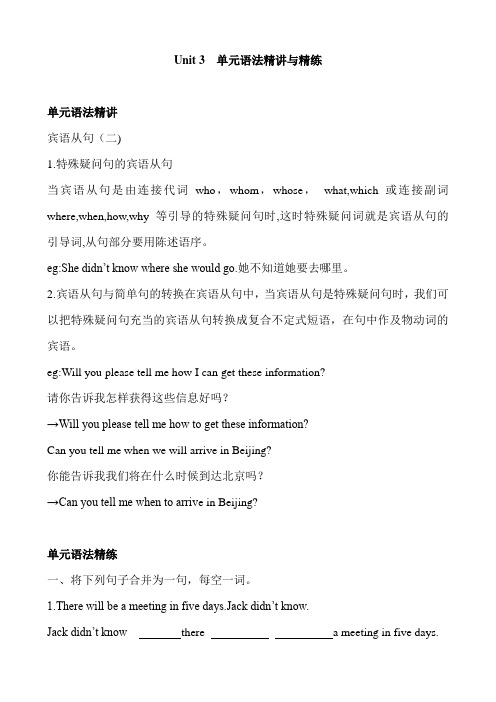
Unit 3 单元语法精讲与精练单元语法精讲宾语从句(二)1.特殊疑问句的宾语从句当宾语从句是由连接代词who,whom,whose,what,which 或连接副词where,when,how,why 等引导的特殊疑问句时,这时特殊疑问词就是宾语从句的引导词,从句部分要用陈述语序。
eg:She didn’t know where she would go.她不知道她要去哪里。
2.宾语从句与简单句的转换在宾语从句中,当宾语从句是特殊疑问句时,我们可以把特殊疑问句充当的宾语从句转换成复合不定式短语,在句中作及物动词的宾语。
eg:Will you please tell me how I can get these information?请你告诉我怎样获得这些信息好吗?→Will you please tell me how to get these information?Can you tell me when we will arrive in Beijing?你能告诉我我们将在什么时候到达北京吗?→Can you tell me when to arriv e in Beijing?单元语法精练一、将下列句子合并为一句,每空一词。
1.There will be a meeting in five days.Jack didn’t know.Jack didn’t know there a meeting in five days.2.Where is the city park? Could you tell me?Could you tell me the city park ?3.Are the children playing games? Tell me.Tell me the children games.4.How many people can you see in the picture? Who knows?Who knows how many people in the picture?5.What does he often talk about? The girl wondered.The girl wondered he often about.二、将下列句子合并为宾语从句。
2022年高考英语语法精讲与精练(句子成分和基本句型)
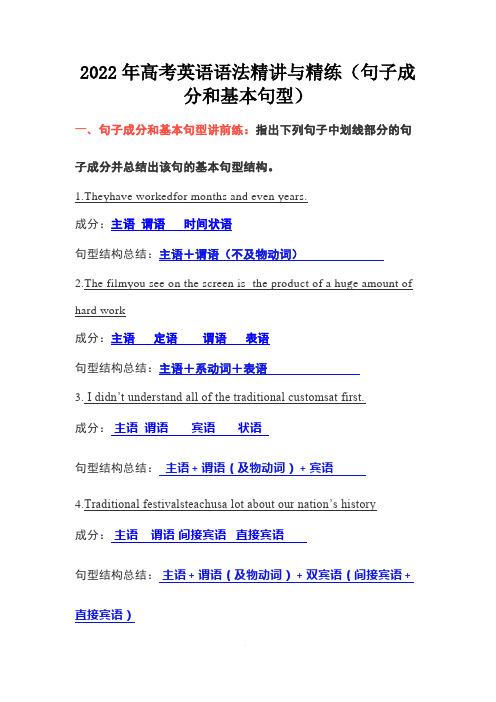
2022年高考英语语法精讲与精练(句子成分和基本句型)5.Traditional festivalsenableusto learn fine Chinese values成分:主语谓语宾语宾语补足语句型结构总结:主语+谓语+复合宾语(宾语+补语)小结:从以上的练习中可知英语中的句子成分包括:主语,谓语,宾语,表语,定语,状语,宾语补语二、句子成分和基本句型精讲(一)、句子成分:1、主语: 说明句子所谈的是:“什么人”或“什么物”,主语通常由名词、代词或相当于名词的词或短语充当。
EG:Lucy likes her new car very much. 露西喜欢她的新车。
【名词作主语】He goes to and from schoolby bike every day.他每天都起得很早。
(代词作主语)To learn English well is a challenge.学好英语是一项挑战性工作。
【不定式短语作主语】2、谓语: 说明主语“做什么”、“是什么”或“怎么样”,英语中谓语只能用动词充当。
例如:We work hard.我们努力工作。
The boy caught a bird. 那个男孩逮住一只鸟。
He is like his father. 他像他父亲。
注意:介词不能作谓语,必须与be动词连用,构成系表结构,一起作谓语。
谓语和主语在人称和数方面必须保持一致。
EG:Music is the utmost pleasure in life.音乐是人生最大的快乐。
As I take each bite, the sweet and mild flavour of the red bean filling slowly fills my mouth.3、宾语: 宾语是动作的对象。
由名词、代词或相当于名词的词或短语充当,说明主语做“什么”。
EG:Tom bought a story-book.汤姆买了一本故事书。
八年级英语人教版上册Unit3_语法精讲精练

Unit3 语法精讲精练Grammar in UseA. Multiple choices.( ) 1. My parents and I have many different ideas _______different ways.A. atB. inC. toD. on( ) 2. Both she and I _______ from Canada.A. isB. amC. areD. be( ) 3. My shoes are cheaper than_______.A. youB. yourC. yoursD. your one( ) 4. Mary has lots of friends, but I don’t. Mary is_______ than me.A. quieterB. more seriousC. more popularD. funnier( ) 5. My best friend is good _______swimming, but I do well_______ running.A. at, inB. in, atC. at, atD. in, in( ) 6. Which subject do you like___ English or Chinese?A. goodB. wellC. betterD. best( ) 7. I like talking with others. But Tom doesn’t. He often reads books. So Tom is _______than I am.A. funnierB. more outgoingC. wilderD. calmer( ) 8. John can’t get up as_______ as his little sister.A. earlierB. earlyC. more earlyD. very earlyB. Complete the sentences using proper forms of the given words.1. Tom is_______ (athletic) than Jim.2. Lucy enjoys _______ (tell) jokes. She is much_______ (funny) than others.3. Mr. Green is not as_______ (serious) as Mr. Brown.4. Jim can’t run_______ (fast) than Jill.5. Mary is very_______ (outgoing).6. Unit4 is_______ (difficult) than Unit 5.7. There are_______ (many) boys in our class than in theirs.参考答案Grammar in UseA1-5 B C C C A 6-8 C D BB 1. more athletic 2. telling, funnier 3. serious 4. faster 5.outgoing6. more difficult7. more8. larger9. heavier 10. biggerC 2. Does Jack run as fast as Sam? faster3. Is your cousin as outgoing as you? more outgoing。
新人教版八年级下册英语Unit 4语法作文专练3 单元语法小专题(Grammar Focus)

单元语法小专题(Grammar Focus)语法精讲一、提建议的常用表达方式1.表示建议的常用句型——“建言献策”六法(1)直接建议法。
常用“Let's+动词原形”。
如:Let's go and see them.我们去看看他们吧。
(2)委婉建议法。
常用“Shall we+动词原形?”或“Could you please…?”。
如:Shall we go to the zoo?我们去动物园好吗?Could you please help me clean the room?能请你帮我打扫房间吗?(3)征求性建议法。
常用“How about/What about+名词或v.-ing形式?”。
如:What about this hotel?这家宾馆怎么样?How about going swimming?去游泳怎么样?(4)劝告性建议法。
常用“had better+动词原形”。
如:You'd better go to school on foot.你最好步行去学校。
(5)责备性建议法。
常用“Why not+动词原形?”或“Why don't you+动词原形?”。
如:Why not go and ask the teacher?=Why don't you go and ask the teacher?为什么不去问一下老师呢?(6)请求性建议法。
常用“Would you like+名词或动词不定式?”。
如:Would you like some bananas?你想吃香蕉吗?Would you like to play games with us?你想和我们一起玩游戏吗?2.回答建议的常用句型(1)肯定回答:OK./All right./Great.好的。
/行。
/太好了。
Good idea!/That's a good idea!好主意!/那是个好主意!That sounds great/good/…(那)听起来很棒/好/……Yes,please./Yes,I'd love to.是的。
七年级英语下册Unit3Schoollife词句精讲精练
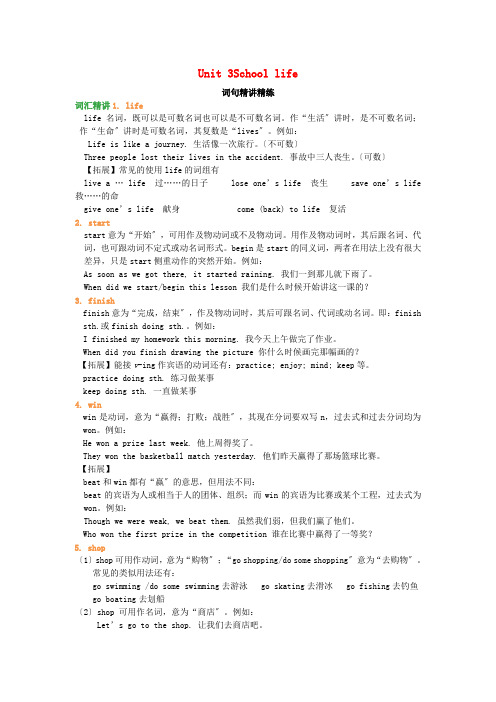
Unit 3School life词句精讲精练词汇精讲1. lifelife 名词,既可以是可数名词也可以是不可数名词。
作“生活〞讲时,是不可数名词;作“生命〞讲时是可数名词,其复数是“lives〞。
例如:Life is like a journey. 生活像一次旅行。
〔不可数〕Three people lost their lives in the accident. 事故中三人丧生。
〔可数〕【拓展】常见的使用life的词组有live a … life 过……的日子 lose one’s life 丧生 save one’s life 救……的命give one’s life 献身 come (back) to life 复活2. startstart意为“开始〞,可用作及物动词或不及物动词。
用作及物动词时,其后跟名词、代词,也可跟动词不定式或动名词形式。
begin是start的同义词,两者在用法上没有很大差异,只是start侧重动作的突然开始。
例如:As soon as we got there, it started raining. 我们一到那儿就下雨了。
When did we start/begin this lesson 我们是什么时候开始讲这一课的?3. finishfinish意为“完成,结束〞,作及物动词时,其后可跟名词、代词或动名词。
即:finish sth.或finish doing sth.。
例如:I finished my homework this morning. 我今天上午做完了作业。
When did you finish drawing the picture 你什么时候画完那幅画的?【拓展】能接v-ing作宾语的动词还有:practice; enjoy; mind; keep等。
practice doing sth. 练习做某事keep doing sth. 一直做某事4. winwin是动词,意为“赢得;打败;战胜〞,其现在分词要双写n,过去式和过去分词均为won。
- 1、下载文档前请自行甄别文档内容的完整性,平台不提供额外的编辑、内容补充、找答案等附加服务。
- 2、"仅部分预览"的文档,不可在线预览部分如存在完整性等问题,可反馈申请退款(可完整预览的文档不适用该条件!)。
- 3、如文档侵犯您的权益,请联系客服反馈,我们会尽快为您处理(人工客服工作时间:9:00-18:30)。
单元同步语法
unless, as soon as, so…that… 引导的状语从句
1.unless 引导的条件状语从句
Unless =〉if…not, 表示反面条件,意为“如果不、除非”。
eg:
They will go tomorrow unless it rains.
=〉They will go tomorrow if it doesn’t rain. 除非明天下雨,否则他们会去的。
I won’t let you in unless you show me your pass.
=〉I won’t let you in if you don’t show me your pass. 如果你不出示通行证,我就不让你进来。
注意:条件状语从句中的谓语动词一般要用现在时或过去时代替一般将来时或过去将来时。
2.as soon as 引导的时间状语从句
as soon as …意为“一……就……”,用来表示主从句的动作是紧接着发生的。
eg:
He will come and see you as soon as he can. 他一有空就来看你。
He rushed home as soon as he got the good news. 他一得到这个好消息就奔回家。
注意:as soon as 引导的时间状语从句在过去时态中主从句时态一致;若主句用一般将来时态,则从句用一般现在时态。
3.so…that…引导的结果状语从句
so…that意为“如此……以致……”,其引导的结果状语从句有如下四种结构:
(1)so+形容词/副词+that从句。
eg:
The village is so small that it cannot be shown in the map. 这村子太小,所以这地图上没有。
The wind was so strong that we could hardly move forward. 风刮得那么大,我们简直寸步难行。
(2)so+形容词+a/an+单数名词+that从句。
eg:
It was so hot a day that they all went swimming. 天是那么的热以致他们都去游泳了。
He made so inspiring a speech that everybody got excited. 他发表了如此鼓舞人的演讲以致大家都很激动。
(3)so+many/few+复数名词+that从句。
eg:
I have had so many falls that I am black and blue all over. 我摔了许多跤,以致于浑身青一块,紫一块。
He has so few friends that he often feels lonely. 他朋友很少,所以经常感到孤独。
(4)so+much/little+不可数名词+that从句。
eg:
I had so little money then that I couldn’t even afford a used car. 我当时囊中羞涩,甚至连一辆二手车都买不起。
He drank so much wine last night that he felt terrible. 昨晚他喝了那么多的酒,他觉得很不舒服。
单元同步语法强化训练
Ⅰ.用连词if, unless, as soon as 或so/such…that填空。
1.The animals were ______ lovely _______ I spent a whole day in the zoo.
2. _______it is cold tomorrow, he will stay at home and watch TV.
3.I sent some flowers to her _________ she finished speaking on the stage.
4.It was ________ an interesting story _________ everyone fell in love with it.
5.I won’t let you in ________ you get here on time.
6.He rushed home ___________ he got the good news.
7.You can’t get here on time _________ you get up earlier than before.
Ⅱ.同义句转换,每空一词。
8.The movie is so exciting that all of us want to see it again.
It is_____ ______ ______movie that all of us want to see it again.
9.He is too weak to carry the chair. He’s _____ _____ ______ he can’t carry the chair.
10.She will go to the party if she is free.
She won’t go to the party _______ she _______ free.
11.He finished his homework. He handed his homework in at once.
He handed his homework in _____ _____ ____ he finished it.
12.Zhang Lili was so brave that she saved her students. Zhang Lili was _______ _______ to save her students. Ⅲ.根据汉语意思完成句子,每空一词。
13.除非这个星期六下雨,否则我们就去公园。
We _____ ______to the park ______ it _______ this Saturday.
14.迈克总是一到家就打开电脑。
Mike always turns on the computer ______ _____ ______ he gets home.
15.这个房间如此大以致于能容纳20人。
This room is _______ big ________ it can hold 20 people.。
